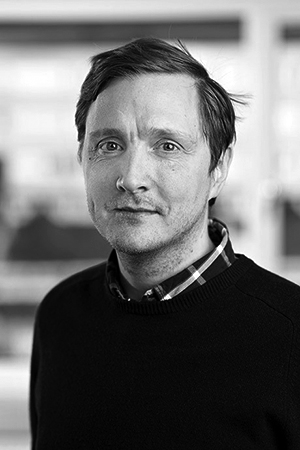Alexander Paulsson | April 2024

Tell us about who you are and how you got here
I am Associate Professor at the Department of Business Administration in the School of Economics and Management. I ended up here by a what I usually describe as a ‘happy accident’. I originally studied history and political science but also took a few classes in business. I got to know a few people in this department who were doing research on public organizations and public administration, and I found that I had similar interests. One thing led to another and I started the PhD program here. After my PhD, I did a post-doc at the Swedish Road and Transport Research Institute (VTI) and developed an interest in transport and mobility. So, I usually say that my research field is organizational studies with a focus on the transport sector and various aspects of mobility.
How do your research interests connect to urban issues?
I conduct research on two topics. One is on mobility and transport as well as transport infrastructure. I have a project on urban cycling logistics where we study the development of food delivery and e-commerce services based around the bike. In the project, we are exploring what the bike-based delivery companies are doing, their challenges, and their social responsibility for working relations and labor standards. I also conduct research on infrastructure maintenance. In Sweden, there is a huge infrastructural debt. A MISTRA program called Inframaint was established to address this and here, I examine how municipalities are maintaining road networks and sewage systems.
My other research topic is a bit different and is connected to economy and how economic ideas shape our approach to the environment. I engage in post-growth research and am part of the Agenda 2030 excellence program called Post Growth Welfare Systems, where we explore how welfare systems can cope without growth. The reality is that welfare services are shrinking in a lot of countries and actually need to shrink to reduce environmental impacts. So my colleagues and I are considering how the welfare state can thrive in a post-growth economy. What kind of welfare services can be provided and how can they be organized? What is the demand for welfare services in a scenario without growth?
And I have a current project that focuses on money and sustainability. The Swedish kroner and the euro are examples of ‘general purpose money’. With these types of money, you can compare things that have been produced under, for example, substandard labor laws and different environmental regulations. When you go to a store with this kind of money, you are often inclined to buy goods where you can get the best value for your money. In this project, we are exploring a different kind of money called ‘special purpose money’ that has the potential to change how we spend money. Where general purpose money unconsciously reproduces capitalist relations (whether we want it to or not), special purpose money can only be used to buy sustainable goods. We are investigating different types of special purpose money such as complementary and local currencies that support local businesses. We are interested in how money can be redesigned to promote a localized metabolism and support more sustainable forms of consumption.
What are some future research topics that you would like to explore?
The idea I just described about special purpose money is definitely a future area of research. Special purpose money was launched in the 1960s and 1970s so it has been around for a while but there is a need for more study of how it is used and how it affects consumption. There are several researchers in sociology, anthropology, and architecture that are studying money but few economists (which might not be surprising since they might take money for granted). So there is a lot of opportunity to develop these ideas further. There is so much going on with money!
What do you find especially exiting about cities and the urban realm?
From a more personal perspective and a DIY background, I like cities where there is a thriving underground music scene and a culture connected to it. Cities are places with a concentration of people, capital, ideas, and movements. This is what makes them simultaneously fascinating and challenging.
How does the Urban Arena support your research?
I really like Urban Arena as a meeting place for interdisciplinary discussions and to generate new ideas involving research and practice. This is a key a strength of the network. As a platform for meeting and discussing urban matters across disciplines, it works well.
